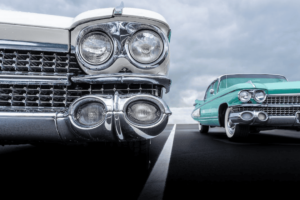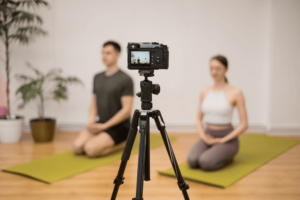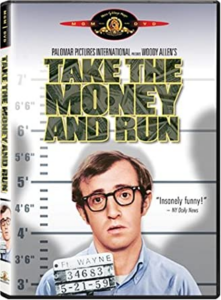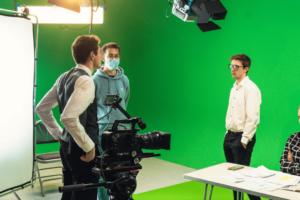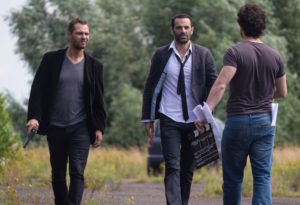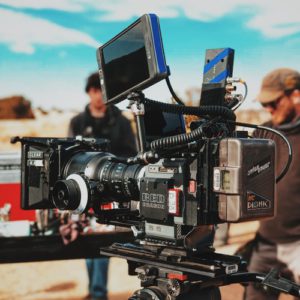What is the distinction between cinematography and videography? Is there a distinction between videographers and cinematographers? Freelancers are redefining these concepts in marketing.
What is the difference between a videographer and a cinematographer?

Understanding the distinction between the two and choosing the correct specialist are critical components of marketing success. The image you want to project for your company and how you want your marketing message to be delivered to your clients can make or break your firm’s success. While both cinematographers and videographers are essentially filming with a camera, there is a significant distinction in how they go about it.
Many buyers are naturally perplexed and annoyed by the differences between these two words. Firms and freelancers are at odds with the actual definitions of terms and how they’re being redefined in video marketing. In this article, we will try to outline the distinct and not-so-distinct differences between the two terms.
What are Videography and Cinematography?
Both videography and cinematography are concerned with obtaining footage. Still, they differ in a person’s perspective on the filmmaking process. The term “videography” refers to the capture of live events and moments. Videographers work on smaller projects like wedding videography and are either a one-person crew or a small group of people. Their task is to record videos, operate cameras, capture sound, and perfect the light settings. They live in the moment and videotape the events.
Independent films, low-budget features, and short films may be the responsibility of videographers. However, the term “videographer” is also used in contexts other than filmmaking. You don’t employ a director of photography for your wedding, for example. Maybe you do, but it’s out of most people’s budgets and sensibilities to hire a complete film team for such a small gathering.

Cinematography is similar to videography. However, it entails more strategic planning, artistic direction, or decision-making and usually necessitates a big crew or production team. For example, a cinematographer is responsible for the final production of a music video or a high-end Hollywood film.
The difference between the two titles is the size of the crew and the production. Directors of photography, or DP for short, is another term for cinematographers. The DP is in charge of a lot more than just the camera. They take care of the lighting, shot composition, camera movement during a scene, color palette, and mood of the scene- the list continues on and on. The DP needs to answer to everyone who is in charge of making the scene happen. In what the audience sees, he or she is the last voice.
A cinematographer not only captures images but also evokes a feeling in the audience. He works hard to implore emotions and provoke thought, whether recreation, hatred, grief, happiness, violence – whatever!
A videographer mainly does the groundwork. As a one-person army, you will be shooting, editing, composing music, fixing the lighting – everything.
Filmmaker Whit Ingram states, “Cinematography is obviously much more of an artistic approach to filming.” “It’s a lot more planned out – a fantastic method to truly communicate anything, whether abstract or realistic.”

Can Someone be Both Videographer and Cinematographer?
Can they, however, be the same? Is it possible for a videographer to call himself a cinematographer? The quick answer is that it is debatable.
I know, it sounds like a cop-out, but hang in there. We are not done yet. Let’s take a short review of what we have covered so far.

More than just photos are captured by a cinematographer. A cinematographer creates emotion and works tirelessly to make the audience feel something. They’re artists, after all, and art is supposed to evoke emotion and stimulate thought. A videographer is, in the purest sense, a groundworker. A videographer is a one-person crew or one-person band, that handles all filming, editing, and music.
Factors Which Determine the Difference Between Cinematographer and Videographer
Teamwork or Flying Solo
Cinematographers collaborate as a group. A cinematographer will have the largest number of artists in any film or movie. They will provide direction to their teammates. They will tell their colleagues to modify camera angles, exposure, shot sizes, camera moves, and so on because they are in control of the camera and lighting department.
Videographers usually operate alone or with a small crew. They will video capture the event alone or with one or two coworkers at any business meeting or conference. They will make adjustments to the camera’s movements and angles, exposure, shutter speed, and so on. They will not issue or receive any commands.
Type of Work
Cinematographers have a wide range of abilities in a narrow profession. They primarily work in film and other forms of storytelling, such as short films and drama series. They do, however, have the extraordinary ability to tailor their project timelines; for example, they can work on the first half of a film today and finish the second half in a few months. They can work on multiple projects at the same time because this is not a one-day job.
In an infinite field, videographers have a limited scope. They specialize in business meetings, conferences, TV shows, wedding and wedding receptions, birthday parties, school and college activities, corporate events, and other similar occasions. Even though they have a lot of openings, they will work hard for two to ten days at a time and then relax for a while. They cannot work at the same time as cinematographers. Instead, they begin a project and work on it until it is completed.
Full-Fledged Movie or Capturing Moments/ Events
Cinematographers will capture a complete motion image. They will never be oblivious to any scene. They will pay close attention to the script, beginning with pre-production. They will ask the filmmaker absurd questions like “How should the viewers feel about a scene?” They will offer recommendations to the director. Once the director approves, the cinematographer will begin working with the rest of the crew.
Videographers will capture only the most significant moments. For example, if a business meeting lasts three hours, the videographer will only shoot for two to two and a half hours. The remaining time will be wasted or irrelevant to the forum. Videographers capture only the inauguration, guest speaker, awarding mementos/prizes, group discussions, and conclusion. They will pay attention to the key parts of the show, not the entire show.
Creativity and Style
Cinematographers enjoy being creative, which is why they choose this profession. They work in the film industry and aim to offer their best artistic work to the table. They will comprehend the film’s storyline, imagine each scene, and then begin their job. Everything they come upon inspires them. Unlike others, they have a distinct point of view. Finally, they will transport you to another universe.
Videographers have limited creative freedom. They strive to add a little bit of flair to the editing process to capture events and circumstances. They will only pay attention to the most important and memorable events. They make an effort to make sequences enjoyable and fascinating. They experiment with various tactics and procedures to improve their memory.
Entertainment and Business
Cinematographers are born to make people laugh. Their sole purpose is to amuse people. Therefore, they make an effort to infuse the film with new concepts and make it feel amusing. Whether it is a low-budget or high-budget production, a drama series, or a movie, they make it appealing and thrilling. They collaborate closely with the director and production designer to ensure their goals are realized.
Videographers exist solely for business. They collaborate closely with major MNCs and corporations to bring their products or ideas to market. They will research the product’s benefits and functionalities before completing their assignment.
Another Kind – DSLRgraphers
The neat little creation of the DSLR camera is one of the things that is confusing cinematography vs videography these days. The new advanced features of a DSLR enable professional-grade production quality, similar to that seen in Hollywood films. Because it’s so simple to improve your filmmaking skills, many enthusiasts have turned to videography as a career. There is going to be some confusion when amateur videographers produce content that is comparable to that of a professional cinematographer.
People have begun to favor the usage of DSLRs for videography and to give their photos a picturesque movie-like aspect. A friend of mine recently told me about a couple who hired a DP for their wedding. Luxurious weddings demand professional filming, and the couple deserves to have their tale portrayed through interviews with friends and family, highlights, music, and narration. The DSLR has ushered in a new era of videography, closing the gap that previously existed between cinematographers and videographers.

How to Determine Whether You Need a Videographer or Cinematographer?
Both videographers and cinematographers create motion videos. While there are some similarities between the two vocations, they require different talents. It will be easier to determine which professional you need if you know what type of project or ultimate product you want to create.
Consider the following features of the project when deciding what job you’ll need:
- The project’s size and scope
- The number of persons on the project team or its size
- Before the start of the shoot or production, there is a lot of planning to do.
- Whether or not there is a need for creative direction or artistic decisions.
“Planning is the most significant distinction between cinematography and videography… There is only so much you can plan out with videography, like your gear,” explains cinematographer Shawn Foulks. “You know what’s going to happen because you have information ahead of time, but you do not know what’s going to happen because you do not know what’s going to happen.”
Capture and Live in the Moment with Videography
Videographers are more present-oriented. They spend less time planning ahead of time and, depending on the project, may not be aware of the shooting conditions. Operating cameras, perfecting lighting, and collecting sound are among their primary responsibilities.

Skills Required to Become a Videographer
Knowing how to take footage while on the move necessitates quick thinking. In addition to camera handling, videographers must be informed about their equipment and nimble in uncontrollable conditions such as a live event.
Other skills required to become great videographers are:
Punctuality
Arrive on set with all essential equipment, including video cameras, lenses, spare batteries, memory cards, lighting, and microphones, to adjust to the shoot’s needs.
Knowledge About Angles
When documenting live events, locate the most pleasing shots. Also, adopt the best ways to get into your environment to place your gear to avoid missing any crucial moments.
Leadership
Direct a shoot regardless of the size of the team or crew.
Knowledge About Post-Production
Learn to use video editing tools such as Adobe Premiere Pro.
“As a filmmaker, one of the most important things to learn is how to direct,” says cinematographer and videographer Josh Miller. Although directing is important in videography and cinematography, it is more important for videographers who work with a smaller crew. Strategizing on light arrangement and setup, picking the proper camera lens or gear, and knowing how to cope with environmental limits are all part of videography directing.
Equipment and Gear Needed for Videography
Although videographers operate in varied environments, they control the equipment they bring to the shoot. Filmmakers’ essential kit includes video cameras, DSLR cameras, and camcorders with charged batteries and extra memory cards. They might also require:
- Tripods or stabilizers
- Lighting equipment
- Microphones and audio equipment
- Lens choices for a variety of shot types
Types of Projects a Videographer Helms
Videographers specialize in live event recordings, which range from sporting events to wedding videos. Conference recordings, live interviews, types of journalism, and short films and documentaries are all examples of this. Wedding videographers, promo videographers, business videographers, video editors, and media specialists are all common occupations for videographers.
Artistic Action of Cinematographer
Cinematographers are also known as directors of photography and play an important role in the filmmaking process. They are in charge of planning and arranging the entire film project, which includes:

Pre-Production
Conceive the project’s creative direction, create a storyboard, locate the film crew, secure the shoot locations or venues, and coordinate and communicate with the project’s director.
Production
Ensure that the creative direction is followed, collaborate with camera operators on artistic camera movement and shots, and match exposure, composition, and framing to the creative direction.
Post-Production
Before sending the video to post-production editing, double-check the color grading and color palette.
Cinematographers or directors of photography, with a more creative and artistic approach, require a diverse set of talents, including extensive technical camera knowledge, a breadth of film experience, and, most significantly, communication skills and the ability to lead a film production crew.
The cinematographer is also in charge of assigning crew members roles and responsibilities. A camera operator, Steadicam operator, first and second assistant cameras, gaffer, and key grip are the most critical and frequently required crew members.
Other Equipment the Cinematographer Might Require
Equipment and gear may vary depending on the project’s magnitude, the type of artistic direction, and the director’s vision. Equipment like a DSLR camera or camcorder, tripod, lighting, and memory cards are standard equipment for cinematographers. However, depending on the production value of the project, they may need additional special equipment.
Types of Projects a Cinematographer Works on
Music videos with a storyline, Hollywood-style feature films, and high-end docuseries are examples of cinematic endeavors. However, suppose you’re not ready to be a cinematographer or DP yet. In that case, you can start with related jobs like art direction with a concentration on color grading a film production, or assistant director, first and second assistant camera operators, and motion picture camera operators.
Can Someone be Both?
It is a bit of a cop-out, but that’s the solution. We might argue that it is contingent on how the videographer creates his or her content.

Suppose a videographer checks the requirements of a cinematographer. In that case, they can call themselves one even if they have a minimal budget and crew. A videographer’s ability to perform as a cinematographer varies for every project. However, a larger crew, a better production budget, and more creative freedom can help someone become a cinematographer. So, suppose you’re a videographer who works on many creative projects or is frequently employed by big production companies for large-scale projects. In that case, you can introduce yourself as a cinematographer.
Videography vs. Cinematography Videos
Videography vs. Cinematography
5 Things Cinematographers Do That Videographers Don’t
Videography and Cinematography- Explained
Differences Between Videography and Cinematography
Conclusion
Videography and cinematography capture an event. However, there is a narrow line that separates the two. Cinematography focuses on the art and science of filmmaking. Videography is primarily concerned with capturing an event. The former is more creative and entwined with the art of narrative. In contrast, the latter is about capturing and recording events with limited resources and material constraints.
Hiring a cinematographer makes more sense when you have to choose between videography and cinematography if your goal is brand promotion or marketing.

